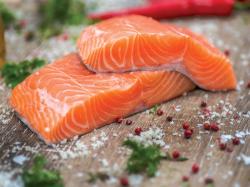How Much Seafood Did You Eat? Photos Jog Memory, Aid Scientific Recommendations
March 30, 2018 | 1 min to read

GAINESVILLE, Fla. — Seafood can be a tasty source of protein that supports a healthy, balanced diet. But too much of anything is not always beneficial, said Anne Mathews, a food and human nutrition scientist with the University of Florida Institute of Food and Agricultural Sciences.
To assess health risks versus benefits of consuming certain seafood products, scientists analyze seafood for nutritional value such as omega fatty acids and possible contaminants, such as mercury. Coupled with an understanding of what people eat, how much they eat, and how often they eat it, scientists can gauge a risk level, UF scientists say.
For example, scientists advise Americans to eat eight to 12 ounces of fish or seafood each week for their nutrient values. On the other hand, as recently as 2011, more than one-third of the country’s inland waterways were under fish advisories due to contamination, according to the U.S. Environmental Protection Agency; hence, the need to potentially limit consumption of certain fish to potentially vulnerable populations.
To read the rest of the story, please go to: Institute of Food and Agricultural Sciences and University of Florida
